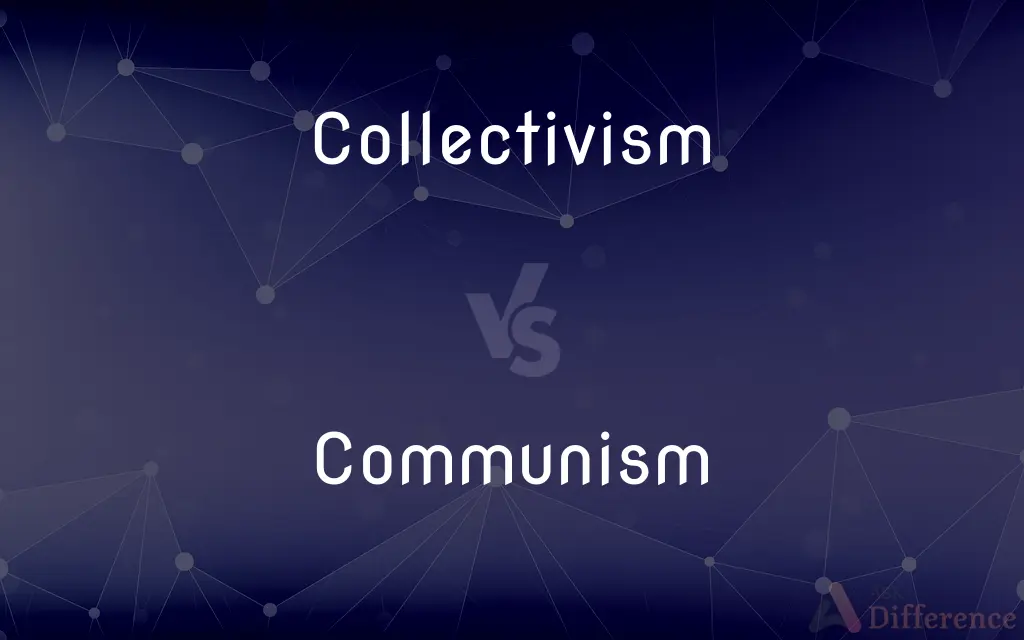Collectivism vs. Communism — What's the Difference?
By Urooj Arif & Maham Liaqat — Updated on April 20, 2024
Collectivism prioritizes group goals over individual ones, common in many cultures and political ideologies, while communism is a specific political and economic ideology aiming for a classless society through shared ownership of resources.

Difference Between Collectivism and Communism
Table of Contents
ADVERTISEMENT
Key Differences
Collectivism is a social philosophy that emphasizes the importance of groups over the individual, advocating for group cohesion and prioritizing group goals. Whereas, communism is a political and economic ideology that seeks to establish a classless, stateless society where all property is communally owned.
In terms of cultural implications, collectivism can be seen in societies that value community bonds and collective well-being, influencing social behaviors and norms. On the other hand, communism involves specific doctrines related to economic and political structures, aiming for the elimination of class distinctions.
Collectivism affects everyday decisions and social interactions, promoting cooperation and community responsibility. Conversely, communism is focused on broader socio-economic reforms, including the redistribution of wealth and the abolition of private property.
While collectivism can exist within different economic systems (capitalist, socialist, etc.), advocating various degrees of collective influence, communism explicitly requires a radical restructuring of economic systems to eliminate private ownership.
In practice, collectivist values can be expressed in diverse ways, from family dynamics to corporate management, without necessitating specific economic reforms. In contrast, communism advocates for revolutionary changes to create a society where all members are economically equal.
ADVERTISEMENT
Comparison Chart
Definition
Social philosophy prioritizing group goals
Political ideology aiming for classlessness
Focus
Group cohesion, social norms
Economic structure, class elimination
Cultural Impact
Influences everyday behavior and decisions
Aims for socio-economic reforms
Economic Requirements
Adaptable to various economic systems
Requires communal ownership, abolishes private property
Implementation
Through social behaviors and values
Through political and economic reforms
Compare with Definitions
Collectivism
Adaptable across different societies.
Collectivist values are evident in many traditional societies around the world.
Communism
Aims to create a classless society.
Communism seeks to redistribute wealth to eliminate economic disparities.
Collectivism
Affects social norms and behaviors.
Collectivism encourages sharing resources among neighbors.
Communism
Advocates for communal ownership of property.
Under communism, factories and land are owned collectively, not individually.
Collectivism
Emphasis on group goals over individual interests.
In a collectivist culture, family decisions are often made together.
Communism
Political and economic ideology.
Communism involves the implementation of policies that abolish private property.
Collectivism
Present in various cultural or organizational contexts.
The company’s management style is heavily influenced by collectivism.
Communism
Seeks to eliminate state structures.
Communism envisions a future where the state apparatus is no longer necessary.
Collectivism
Social philosophy valuing community and cooperation.
Collectivism shapes how community projects are prioritized.
Communism
Based on theories by Karl Marx and others.
Communist ideologies are heavily influenced by Marxist theory.
Collectivism
Collectivism is a value that is characterized by emphasis on cohesiveness among individuals and prioritization of the group over the self. Individuals or groups that subscribe to a collectivist worldview tend to find common values and goals as particularly salient and demonstrate greater orientation toward in-group than toward out-group.
Communism
Communism (from Latin communis, 'common, universal') is a philosophical, social, political, and economic ideology and movement whose ultimate goal is the establishment of a communist society, namely a socioeconomic order structured upon the ideas of common ownership of the means of production and the absence of social classes, money, and, in some cases, the state. As such, communism is a specific form of socialism.
Collectivism
The principles or system of ownership and control of the means of production and distribution by the people collectively, usually under the supervision of a government.
Communism
A theoretical economic system characterized by the collective ownership of property and by the organization of labor for the common advantage of all members.
Collectivism
An economic system in which the means of production and distribution are owned and controlled by the people collectively
Communism
A system of government in which the state plans and controls the economy and a single, often authoritarian party holds power, claiming to make progress toward a higher social order in which all goods are equally shared by the people.
Collectivism
The practice or principle of giving a group priority over each individual in it.
Communism
The Marxist-Leninist doctrine advocating revolution to overthrow the capitalist system and establish a dictatorship of the proletariat that will eventually evolve into a perfectly egalitarian and communal society.
Collectivism
The doctrine that land and capital should be owned by society collectively or as a whole; communism.
Communism
Any far-left political ideology or philosophy advocating holding the production of resources collectively, especially by seizing it through revolution.
Collectivism
Soviet communism
Communism
Any political social system that implements a communist political philosophy.
Collectivism
A political theory that the people should own the means of production
Communism
The international socialist society where classes, money, and the state no longer exist.
Communism
A scheme of equalizing the social conditions of life; specifically, a scheme which contemplates the abolition of inequalities in the possession of property, as by distributing all wealth equally to all, or by holding all wealth in common for the equal use and advantage of all.
Communism
A form of socialism that abolishes private ownership
Communism
A political theory favoring collectivism in a classless society
Common Curiosities
Can collectivism exist within a capitalist society?
Yes, collectivist values can be integrated into various economic systems, including capitalism, where they influence social behaviors and organizational practices.
What is the main difference between collectivism and communism?
Collectivism is a broader social philosophy prioritizing group goals, while communism is a specific political ideology aiming for a classless society through communal ownership.
Can a person support collectivism but not communism?
Yes, one can support collectivist principles in terms of social cooperation and community without endorsing the economic and political tenets of communism.
How do educational systems differ under collectivism and communism?
Collectivist education systems emphasize teamwork and community involvement, while communist education aims to instill ideology and prepare citizens for a classless society.
How do collectivist values impact individual freedom?
Collectivist values may prioritize group consensus and welfare, which can sometimes limit individual choices and freedoms in favor of collective benefits.
What historical examples exist of communist states?
The Soviet Union and Maoist China are historical examples of states that attempted to implement communist ideologies.
How does communism propose to eliminate classes?
Communism aims to abolish private property and redistribute resources, theoretically eliminating economic inequalities that define class structures.
What are examples of collectivist societies?
Many Asian and Scandinavian countries exhibit collectivist cultures, emphasizing community and collective well-being.
What role does leadership play in collectivist and communist systems?
In collectivist systems, leadership often focuses on group harmony and consensus, while in communist systems, leadership may pursue more radical reforms to establish a classless society.
Is communism considered effective in practice?
The effectiveness of communism has been debated, with some arguing that its ideals are difficult to achieve in practice, often leading to unintended economic and social consequences.
Share Your Discovery

Previous Comparison
Neglector vs. Neglecter
Next Comparison
Torah vs. BibleAuthor Spotlight
Written by
Urooj ArifUrooj is a skilled content writer at Ask Difference, known for her exceptional ability to simplify complex topics into engaging and informative content. With a passion for research and a flair for clear, concise writing, she consistently delivers articles that resonate with our diverse audience.
Co-written by
Maham Liaqat














































